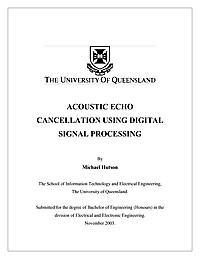
Acoustic Echo Cancellation using Digital Signal Processing
Acoustic echo cancellation is a common occurrence in todays telecommunication systems. It occurs when an audio source and sink operate in full duplex mode, an example of this is a hands-free loudspeaker telephone. In this situation the received signal is output through the telephone loudspeaker (audio source), this audio signal is then reverberated through the physical environment and picked up by the systems microphone (audio sink). The effect is the return to the distant user of time delayed and attenuated images of their original speech signal. The signal interference caused by acoustic echo is distracting to both users and causes a reduction in the quality of the communication. This thesis focuses on the use of adaptive filtering techniques to reduce this unwanted echo, thus increasing communication quality. Adaptive filters are a class of filters that iteratively alter their parameters in order to minimise a function of the difference between a desired target output and their output. In the case of acoustic echo in telecommunications, the optimal output is an echoed signal that accurately emulates the unwanted echo signal. This is then used to negate the echo in the return signal. The better the adaptive filter emulates this echo, the more successful the cancellation will be. This thesis examines various techniques and algorithms of adaptive filtering, employing discrete signal processing in MATLAB. Also a real-time implementation of an adaptive echo cancellation system has been developed using the Texas Instruments TMS320C6711 DSP development kit.




















